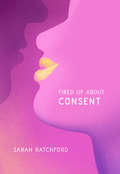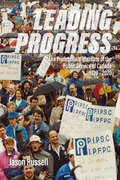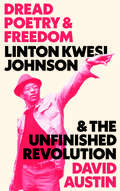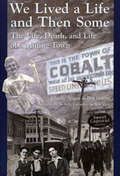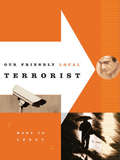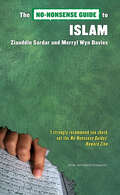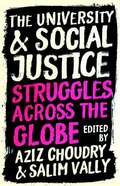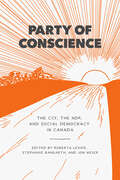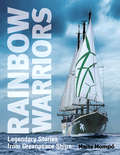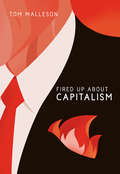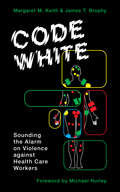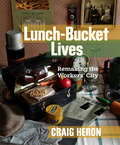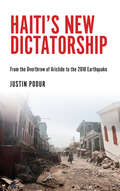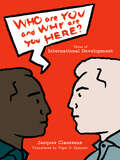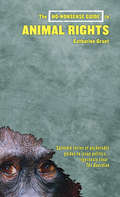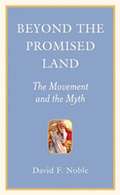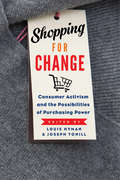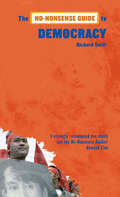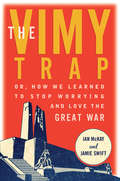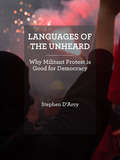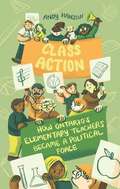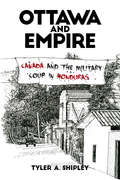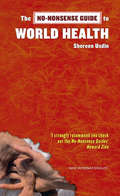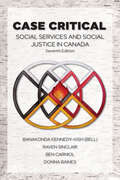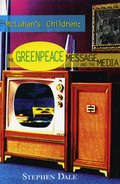- Table View
- List View
Fired Up about Consent
by Sarah RatchfordAccording to the World Health Organization, one in three women will be sexually or physically assaulted in her lifetime. These rates are very similar for non-binary people and other feminized people, too. This is rape culture, and young adults are living through it here and now. Fired Up about Consent is a practical, survivor-informed primer for young people who want to learn how to build joyful, mutually satisfying sex lives and relationships. In these pages, author Sarah Ratchford defines rape and sexual assault, busts the myths behind toothless messaging and outdated advice, and provides sex-positive scripts on how to ask for and offer a clear, enthusiastic, and freely given “Yes!” Along the way, Ratchford touches on topics such as #MeToo, gender identity, masturbation, virginity, porn, sex work, reporting assault, and more, all through a radically inclusive and intersectional lens. The message is loud and clear: not only is consent sexy, it’s mandatory—and everyone deserves frank and empowering literacy around it. Only with empathy, compassion, and resistance can we move forward into a new culture of consent.
Leading Progress: The Professional Institute of the Public Service Canada 1920–2020
by Jason RussellOn February 6, 1920, a small group of public service employees met for the first time to form a professional association. A century later, the Professional Institute of the Public Service Canada (PIPSC) is a bargaining agent representing close to 60,000 public sector workers, whose collective efforts for the public good have touched the lives of every Canadian. Published on the centennial of PIPSC’s founding, Leading Progress is the definitive account of its evolution from then to now—and a rare glimpse into an under-studied corner of North American labour history. Researcher Dr. Jason Russell draws on a rich collection of sources, including archival material and oral history interviews with dozens of current and past PIPSC members. The story that unfolds is a complex one, filled with success and struggle, told with clarity and even-handedness. After decades of demographic and generational shifts, economic booms and busts, and political sea change, PIPSC looks toward its next hundred years with its mission as strong as ever: to advocate for social and economic justice that benefits all Canadians.
Dread Poetry and Freedom: Linton Kwesi Johnson and the Unfinished Revolution
by David AustinSince the 1970s, poet Linton Kwesi Johnson has been putting pen to paper to refute W.H. Auden’s claim that “poetry makes nothing happen.” For Johnson, only the second living poet to have been published in the Penguin Modern Classics series, writing has always been “a political act” and poetry “a cultural weapon.” In Dread Poetry and Freedom David Austin explores the themes of poetry, political consciousness, and social transformation through the prism of Johnson’s work. Drawing from the Bible, reggae and Rastafari, and surrealism, socialism, and feminism, and in dialogue with Aimé Césaire and Frantz Fanon, C.L.R. James and Walter Rodney, W.E.B. Du Bois and the poetry of d’bi young anitafrika, Johnson’s work becomes a crucial point of reflection on the meaning of freedom in this masterful and rich study.
We Lived a Life and Then Some: The Life, Death, and Life of a Mining Town
by Charlie Angus Brit GriffinBased on in-depth oral interviews with local residents, and rich archival sources, We Lived A Life and Then Some relates the common person’s struggle to overcome harsh working conditions and government neglect. The unique culture of the hardrock mining town of Cobalt is exposed through the eyes of retired miners, young welfare mothers, and grade-school children. Angus and Griffin reveal why, in spite of great adversity, Cobalt remains a distinctive and cohesive working-class community.
Our Friendly Local Terrorist
by Mary Jo LeddyOur Friendly Local Terrorist tells the story of the fourteen-year struggle of Suleyman Goven, a Kurd accused by the Canadian Security Intelligence Service of being a terrorist. Mary Jo Leddy was “accidentally” present at Suleyman’’s first interview with CSIS. During that eight-hour ordeal he was propositioned: you work for us as a spy and you’ll get your papers; otherwise—there are no guarantees. Mary Jo continued to be a witness to this bizarre and painful process over the following years at judicial and semi-judicial hearings, which finally ruled that Suleyman ought to be given his papers. This moving personal story explores the efficacy of the immigration and security clearance systems in the Canadian government. It also provides an entry into the (often-complex) political dynamics and pressures within Kurdish communities in Canada and elsewhere in the diaspora, and reveals Turkey’s role and influence in international relations when the tender of huge business contracts is at stake.
No-Nonsense Guide to Islam (No-Nonsense Guides #19)
by Merryl Wyn Davies Zia SardarEven before September 11, 2001, Muslims were often framed by Western media and many non-Muslims as enemies of “freedom” and “progress.” Like other religions, Islam is not without its ongoing tensions and struggles. However, like other religions, there is a depth and richness to the Islamic faith that is too often overlooked because of stereotypes. This No-Nonsense Guide looks at the complexities of Islam and how its adherents are reconciling their faith with the social realities of the twenty-first century. In so doing, Merryl Wyn Davies and Zia Sardar examine the Qur’an and Islamic law (sharia), how world history has been shaped by Islam, Islam’s rocky relationship with the Western world, and the many challenges within and without Islam.
The University and Social Justice: Struggles across the Globe
by Aziz Choudry and Salim VallyHigher education has long been contested terrain. From student movements to staff unions, the fight for accessible, critical, and quality public education has turned university campuses globally into sites of struggle. Whether calling for the decommodification or the decolonization of education, many of these struggles have attempted to draw on (and, in turn, resonate with) longer histories of popular resistance, broader social movements, and radical visions of a fairer world. In this critical collection, Aziz Choudry, Salim Vally, and a host of international contributors bring grounded, analytical accounts of diverse struggles relating to higher education into conversation with each other. Featuring contributions written by students and staff members on the frontline of struggles from 12 different countries, including Canada, Chile, France, India, Mexico, Nigeria, Occupied Palestine, the Philippines, South Africa, Turkey, the UK, and the US, the book asks what can be learned from these movements’ strategies, demands, and visions.
Party of Conscience: The CCF, the NDP, and Social Democracy in Canada
by Roberta Lexier Stephanie Bangarth Jon WeierSurveying the field of political history in Canada, one might assume that the politics of the nation have been shaped solely by the Liberal and Conservative parties. Relatively little attention has been paid to the contributions of the CCF and NDP in Canadian politics. This collection remedies this imbalance with a critical examination of the place of social democracy in Canadian history and politics. Bringing together the work of politicians, think tank members, party activists, union members, scholars, students, and social movement actors in important discussions about social democracy delving into an array of topics including municipal, provincial, and national issues, labour relations, feminism, contemporary social movements, war and society, security issues, and the media, Party of Conscience reminds Canadians of the important contributions the CCF and NDP have made to a progressive, compassionate idea of Canada.
Rainbow Warriors: Legendary Stories from Greenpeace Ships
by Maite MompóFollowing the lives of the three Greenpeace ships with the name Rainbow Warrior, long-serving Greenpeace activist, Maite Mompó tells the inside stories of life on board and recounts some of the ships’ most exciting adventures and actions. Rainbow Warriors provides a narrative of real life on board, a history of these famous vessels, and a history of Greenpeace that goes beyond the organization’s work on the oceans. Starting with the early life of Greenpeace and the bombing of the Rainbow Warrior I by the French secret service through to the imprisonment of the Arctic 30 by the Russians, the stories are brought to life with colour photos from the Greenpeace archives, maps, and nautical charts. Mompó’s tales from the high seas are full of action and daring but also of humanity and great compassion.
Fired Up about Capitalism (Fired Up #1)
by Tom MallesonThere is no alternative to free-market capitalism. At least that’s what we’ve been told since the 1980s, when Margaret Thatcher first declared the debate over. Politicians daily declare it, journalists parrot it, talk show hosts acquiesce to it, rich people gloat about it, and regular people simply assume it. Fired Up about Capitalism forcefully argues that this is nothing but a myth. Tom Malleson exposes the reality of contemporary capitalism–from the widening inequality between the 1% and the rest of society, to ecological devastation–and demonstrates that in fact there are many alternatives. By demonstrating a wide range of examples of alternatives from around the world, from the short-term and practical to the long-term and ambitious, Malleson shows that replacing contemporary capitalism is not pie-in-the-sky utopia, but a real possibility as long as enough of us fight back against injustice and insist that a better world is possible.
Code White: Sounding the Alarm on Violence against Health Care Workers
by Margaret M. Keith James T. BrophyWhen health care workers call a Code White, it’s an emergency response for a violent incident: a call for help. But it’s one that goes unanswered in hospitals, clinics, and long-term care homes across the country. Code White exposes a shocking epidemic of violence that’s hidden in plain sight, one in which workers are bruised, battered, assaulted, and demeaned, but carry on in silence, with little recourse or support. Researchers Margaret M. Keith and James T. Brophy lay bare the stories of over one hundred nurses and personal support workers, aides and porters, clerical workers and cleaners. The nightmarish experiences they relate are not one-off incidents, but symptoms of deep systemic flaws that have transformed health care into one of the most dangerous occupational sectors in Canada. The same questions echo in the wake of each and every brutal encounter: Is violence and trauma really just “part of the job”? Why is this going underreported and unchecked? What needs to be done, and how?
Lunch-Bucket Lives: Remaking the Workers’ City
by Craig HeronLunch-Bucket Lives takes the reader on a bumpy ride through the history of Hamilton’s working people from the 1890s to the 1930s. It ambles along city streets, peers through kitchen doors and factory windows, marches up the steps of churches and fraternal halls, slips into saloons and dance halls, pauses to hear political speeches, and, above all, listens for the stories of men, women, youths, and children from families where people relied mainly on wages to survive. Heron takes wage-earning as a central element in working-class life, but also looks beyond the workplace into the households and neighbourhoods—settlement patterns and housing, marriage, child care, domestic labour, public health, schooling, charity and social work, popular culture, gender identities, ethnicity and ethnic conflict, and politics in various forms—presenting a comprehensive view of working-class life in the first half of the twentieth century. This book has been published with the help of a grant from the Federation for the Humanities and Social Sciences, through the Awards to Scholarly Publications Program, using funds provided by the Social Sciences and Humanities Research Council of Canada.
Haiti’s New Dictatorship: The Coup, the Earthquake and the UN Occupation
by Justin PodurIn 1804 Haiti became the world’s first independent Black republic following a slave revolution. Two hundred years later, ravaged by colonialism and corrupt elites, it was placed under a UN military occupation. Haiti’s New Dictatorship is the history of the past seven years, from the 2004 coup against Aristide to the devastating 2010 earthquake,revealing a shocking story of abuse and neglect by international forces. Justin Podur reveals the reality of a supposedly benign international occupation, arguing that the denial of sovereignty is the fundamental cause of Haiti’s problems. A powerful challenge and wake-up call to the international NGO and development community, Haiti’s New Dictatorship is essential reading for anyone concerned with justice in the global south and progressive development policies.
Who Are You and Why Are You Here?: Tales of International Development
by Jacques ClaessensEvery international development project looks good on paper until someone asks, “Who are you and why are you here?” In this case, it’s a man from northern Burkina Faso. His question reveals everything wrong with international development work today. Jacques Claessens questions the real effects of development programs and agencies, NGOs, and multinational corporations on the economy and welfare of the global south—from a Kafkaesque well-drilling project in Udathen to the Chernobyl-like environmental devastation wrought by the Canadian-owned Essakane mine. Through tales of uneasy encounters between nomadic Tuaregs and Western engineers, well-meaning NGO staff and their incredibly self-serving bosses, UN bureaucrats, a greedy Canadian mining company, and Burkinabe villagers–all pursuing ostensibly noble goals, all barely listening to each other–we begin to understand the realities of international development.
No-Nonsense Guide to Animal Rights (No-Nonsense Guides #1)
by Catharine GrantThe protection of animal rights is more than a modern, western phenomenon. In fact, there is a long history of concern for animals around the world, and it is this concern that underlies today’s animal rights movement. The No-Nonsense Guide to Animal Rights explains the key issues, charts the growth of the movement, looks at welfare and protection laws, and makes connections between animal rights and other justice struggles. A practical day-to-day guide is included to help readers understand what they can do to minimize the exploitation of animals.
Beyond the Promised Land: The Movement and the Myth (Provocations #1)
by David F. NobleIconoclast David F. Noble traces the evolution and eclipse of the biblical mythology of the Promised Land, the foundational story of Western Culture. Part impassioned manifesto, part masterful survey of opposed philosophical and economic schools, Beyond the Promised Land brings into focus the twisted template of the Western imagination and its faith-based market economy. From the first recorded versions of “the promise” saga in ancient Babylon, to the Zapatistas’ rejection of promises never kept, Noble explores the connections between Judeo-Christian belief and corporate globalization. Inspiration for activists and students alike.
Shopping for Change: Consumer Activism and the Possibilities of Purchasing Power (G - Reference, Information and Interdisciplinary Subjects)
by Louis Hyman and Joseph TohillConsuming with a conscience is one of the fastest growing forms of political participation worldwide. Every day we make decisions about how to spend our money and, for the socially conscious, these decisions matter. Political consumers “buy green” for the environment or they “buy pink” to combat breast cancer. They boycott Taco Bell to support migrant workers or Burger King to save the rainforest. But can we overcome the limitations of consumer identity, the conservative pull of consumer choice, co-optation by corporate marketers, and other pitfalls of consumer activism in order to marshal the possibilities of consumer power? Can we, quite literally, shop for change? Shopping for Change brings together historical and contemporary perspectives of academics and activists to show readers what has been possible for consumer activists in the past and what might be possible for today’s consumer activists.
No-Nonsense Guide to Democracy, 2nd edition (No-Nonsense Guides #5)
by Richard SwiftIn this updated edition of the No-Nonsense Guide to Democracy, Richard Swift explores how democracy has been constricted and deformed by economic power-brokers and a self-serving political class from Birmingham to Bangalore. The book includes chapter-length discussions of topics such as the economic meltdown, Barack Obama, eco-democracy, democratizing the economy, and democracy in the Global South. It is not only a guide to the rich diversity of forms of elected government, but it also contains practical ideas for empowering today’s voters around the world.
The Vimy Trap: or, How We Learned To Stop Worrying and Love the Great War
by Ian McKay Jamie SwiftThe story of the bloody 1917 Battle of Vimy Ridge is, according to many of today’s tellings, a heroic founding moment for Canada. This noble, birth-of-a-nation narrative is regularly applied to the Great War in general. Yet this mythical tale is rather new. “Vimyism”— today’s official story of glorious, martial patriotism—contrasts sharply with the complex ways in which veterans, artists, clerics, and even politicians who had supported the war interpreted its meaning over the decades. Was the Great War a futile imperial debacle? A proud, nation-building milestone? Contending Great War memories have helped to shape how later wars were imagined. The Vimy Trap provides a powerful probe of commemoration cultures. This subtle, fast-paced work of public history—combining scholarly insight with sharp-eyed journalism, and based on primary sources and school textbooks, battlefield visits and war art—explains both how and why peace and war remain contested terrain in ever-changing landscapes of Canadian memory.
Languages of the Unheard: Why Militant Protest is Good for Democracy
by Stephen D'Arcy“What we must see,” Martin Luther King once insisted, “is that a riot is the language of the unheard.” In this new era of global protest and popular revolt, Languages of the Unheard draws on King’s insight to address a timely and controversial topic: the ethics and politics of militant resistance. Using vivid examples from the history of militancy—including armed actions by Weatherman and the Red Brigades, the LA Riots, the Zapatista uprising, the Mohawk land defence at Kanesatake, the Black Blocs at summit protests, the occupations of Tahrir Square and Zuccotti Park, the Indigenous occupation of Alcatraz, the Quebec Student Strike, and many more—this book will be of interest to democratic theorists and moral philosophers, and practically useful for protest militants attempting to grapple with the moral ambiguities and political dilemmas unique to their distinctive position.
Class Action: How Ontario’s Elementary Teachers Became a Political Force
by Andy HansonIn this inspiring history of a union, labour historian Andy Hanson delves deep into the Elementary Teachers’ Federation of Ontario (ETFO) and how it evolved from two deeply divided unions to one of the province’s most united and powerful voices for educators. Today’s teacher is under constant pressure to raise students’ test scores, while the rise of neoliberalism in Canada has systematically stripped our education system of funding and support. But educators have been fighting back with decades of fierce labour action, from a landmark province-wide strike in the 1970s, to record-breaking front-line organizing against the Harris government and the Common Sense Revolution, to present-day picket lines and bargaining tables. Hanson follows the making of elementary teachers in Ontario as a distinct class of white-collar, public-sector workers who awoke in the last quarter of the twentieth century to the power of their collective strength.
Ottawa and Empire: Canada and the Military Coup in Honduras
by Tyler ShipleyIn June 2009, the democratically elected president of Honduras was kidnapped and whisked out of the country while the military and business elite consolidated a coup d’etat. To the surprise of many, Canada implicitly supported the coup and assisted the coup leaders in consolidating their control over the country. Since the coup, Canada has increased its presence in Honduras, even while the country has been plunged into a human rights catastrophe, highlighted by the assassination of prominent Indigenous activist Berta Cáceres in 2016. Drawing from the Honduran experience, Ottawa and Empire makes it clear that Canada has emerged as an imperial power in the 21st century.
No-Nonsense Guide to World Health (No-Nonsense Guides #29)
by Shereen UsdinHere is a clear, wide-ranging introduction to the worldwide state of human health. Starting with a brief history of modern medical progress, Shereen Usdin then untangles the knot created by poverty and globalization to show that where you live, how wealthy you are, and your gender all have a bearing on the diseases you may encounter in your lifetime—and your prospects for prevention, treatment, and ultimately, survival. Pulling no punches, Usdin also blows the whistle on the political economy of illness and how keeping people sick means more money for the pharmaceutical, tobacco, and food industries. This No-Nonsense Guide is a must-read for anyone who wants a clear sense of how healthy our global family really is.
Case Critical: Social Services and Social Justice in Canada
by Banakonda Kennedy-Kish (Bell) Raven Sinclair Ben Carniol Donna BainesThis latest edition of Case Critical applies decolonized, critical analysis to highlight what is often hidden from view for most Canadians: the personal trauma and communal devastation inflicted on Indigenous people by past and present colonialism and the ways in which neoliberal tax cuts, austerity, and privatization create more inequality, homelessness, and despair among both Indigenous and non-Indigenous people. Social service providers, the authors argue, should become social activists, working in solidarity with progressive grassroots social movements in order to de-legitimatize colonial and neoliberal policies. Looking for the PDF of Table 5.1: Social Work Skills in Social Services (2017)? Download it under “Extras”.
McLuhan’s Children: The Greenpeace Message and the Media
by Stephen DaleMcLuhan’s Children is an inside look at Greenpeace’s rise to global prominence through its savvy use of mass media imagery. From the flamboyant, guerilla-theatre approach to the emergence of environmentalism as a dominant international issue.
